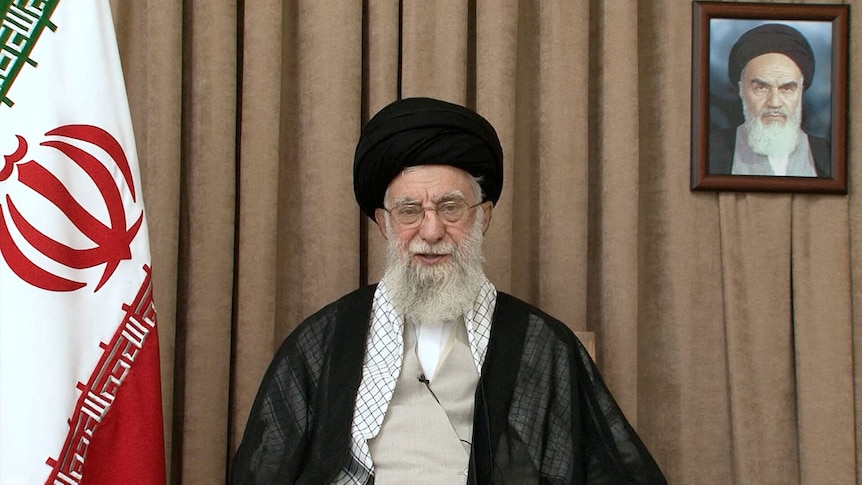Iran's supreme leader Ayatollah Ali Khamenei said Thursday that the United States had "gained nothing" from its attacks during the Islamic republic's 12-day war with Israel that saw nuclear sites hit.
In a statement published by state media, Khamenei said the United States "engaged in the war directly, convinced that its refusal to intervene would lead to the complete destruction of the Zionist regime".
"It has gained nothing from this war," Khamenei said of Washington, adding in his first public remarks since a Tuesday ceasefire ended the war that "the Islamic republic won, and in retaliation dealt a severe slap to the face of America".
"They attacked our nuclear facilities, which of course would merit criminal prosecution in international courts, but they did nothing significant," Khamenei said in a televised speech aired by state TV.
It came as Washington doubled down on its assessment that the strikes had severely undermined Iran's nuclear ambitions.
US Defence Secretary Pete Hegseth said intelligence gathered by the US and Israel indicated the operation "significantly damaged the nuclear programme, setting it back by years."
Referring to US President Donald Trump, who had claimed to have "obliterated" Iran's nuclear programme, Khamenei said that he "exaggerated events in unusual ways, and it turned out that he needed this exaggeration -- anyone who has heard these words has understood that there is another truth behind these words".
Previously, US President Donald Trump said the strikes against three key nuclear sites inside Iran "totally obliterated" them and has responded furiously to reports citing unnamed American officials suggesting the damage may have been less extensive than anticipated.
Speaking alongside senior general Dan Caine at a Pentagon press conference on Thursday morning, Hegseth said the mission was a "historic success" that had "rendered [Iranian] enrichment facilities inoperable."
During an at times combative exchange with reporters, Hegseth also said the US was "not aware of any intelligence" that indicated the enriched uranium had moved out of Fordo—the deeply buried facility that the US targeted with powerful so-called buster bombs—prior to the strikes.
Khamenei, who had been largely out of public view since direct conflict with Israel broke out on June 13, released a televised address on Thursday morning, ending a week-long public silence.
The supreme leader has reportedly been sheltering in a bunker and limiting communications, which has sparked speculation about his whereabouts. Iranian authorities did not disclose where he was speaking from on Thursday, though a senior official acknowledged he was in a safe place earlier this week.
Khamenei used Thursday's video address to threaten to carry out more strikes on US bases in the Middle East if Iran was attacked again and declared victory over both Israel and the US.
Khamenei said Trump had "exaggerated" the impact of the nuclear site strikes, adding, "They couldn't accomplish anything and did not achieve their objective."
Referencing the attack on the US air base in Qatar, Khamenei said, "This incident is also repeatable in the future, and should any attack take place, the cost for the enemy and the aggressor will undoubtedly be very high."
No one was killed during that attack, which Trump said had been flagged before it was launched. The US says the base was not damaged.
Direct confrontation broke out between Iran and Israel on June 13, after Israeli Prime Minister Benjamin Netanyahu said that "if not stopped, Iran could produce a nuclear weapon in a very short time."
A day earlier the global nuclear watchdog's board of governors declared Iran was in breach of its non-proliferation obligations for the first time in 20 years.
Iran has maintained that its nuclear programme is for civilian purposes alone and that it has never sought to develop a nuclear weapon.
On Thursday, Iran approved a parliamentary bill calling for an end to the country's cooperation with the International Atomic Energy Agency (IAEA), meaning it is no longer committed to allowing nuclear inspectors into its sites.
Iran's health ministry said 610 people were killed during the 12 days of air attacks, while Israeli authorities said 28 were killed.
The US became directly involved last weekend, striking facilities in Fordo, Natanz and Isfahan, before Trump sought to rapidly mediate a ceasefire between Israel and Iran.
The ceasefire appeared shaky at first, with Iranian strikes and Israel before an outburst from Trump.
UN nuclear watchdog chief Rafael Grossi said on Wednesday that there was a chance Tehran had moved much of its highly enriched uranium elsewhere as it came under attack.

